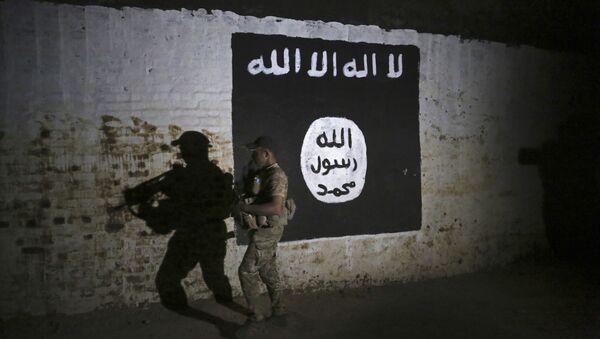On September 20, UK think tank Policy Exchange published a report suggesting the UK population was the world's fifth biggest audience for extremist content in the world (and the largest in Europe) after Turkey, the US, Saudi Arabia and Iraq.
The 130-page report found Daesh produced over 100 new articles, videos and newspapers per week, despite being in retreat in Iraq and Syria, indicating suggestions the group is declining in influence were "significantly overstated."
NEW REPORT: The New Netwar: Countering Extremism Online featuring Foreword from Gen David Petraeus https://t.co/NcyY6FuXns
— Policy Exchange (@Policy_Exchange) September 19, 2017
Its conclusion suggested new laws should criminalize "aggravated possession and/or persistent consumption" of extremist ideology, noting images of child abuse were approached in a similar way, with tougher penalties for the most serious cases. Under Section 58 of the Terrorism Act 2000, it is an offense to possess information that could assist a terrorist, but not material that glorifies terrorism.
2/3 ppl believe internet shd be regulated space & 2/3 wd support creation of independent regulator like @Ofcom to monitor online content pic.twitter.com/znABRmeNoG
— Policy Exchange (@Policy_Exchange) September 19, 2017
The report received a decidedly mixed welcome. Lawyer Khalil Yousuf welcomed its publication, noting online extremism was a "major problem" which must be challenged.
"The narrative of extremism that emanates from a small minority of Muslims must be addressed, whether it's online or in mosques. Islam has brought value to the world for 1,400 years, and it must not be hijacked by unqualified individuals who choose to ignore that the Quran preaches affection towards Christians and other religions, and does not permit extremism or terrorism among believers," Mr. Yousuf told Sputnik.
The peaceful Islam advocate nonetheless noted online extremism is "particularly" difficult to tackle effectively due to "jurisdictional issues" — and suggested any new laws to tackle online extremism must be buttressed by greater funding for the police and security forces, and public acceptance that the state needs greater surveillance resources to ensure the safety of citizens.
"We should allow state to monitor us more closely — ultimately, we all need to make sacrifices for the good of the nation as a whole. We also need to engage communities more, and ensure all Muslims understand their faith better. There is no restriction of the practice of Islam in the UK — so there's no reason for Muslim citizens not to be loyal to the country they live in," Mr. Yousuf concluded.
Thoughts & prayers go out to all those affected by the horrific #BarcelonaAttack. I reiterate my views on security: https://t.co/MypSgFGYQD
— Khalil Yousuf (@KhalilYousuf) August 18, 2017
'Terrorism Industry'
Conversely, Roshan M. Salih, editor of British Muslim news website 5Pillars, is skeptical about the report's recommendations.
"The report is correct in saying people do get radicalized online due to extremist content, and it should be taken down. However, what I fear is that lines get blurred, and definitions of "extremist content" stifle legitimate debate — criticism of Western foreign policy, or the government of Israel. Moreover, it could impact discussion about social matters, given many Muslims have conservative views on issues such as homosexuality," Mr. Salih told Sputnik.
#TheresaMay again calls for extremist (Islamist) ideology to be defeated. Stop bombing the Middle East might be a good start.
— Roshan M Salih (@RmSalih) September 20, 2017
He also believes the report's proposed remedies will be ineffective in tackling the true root causes of Islamic extremism.
"Take all the security precautions you want, but that's not going to stop terrorists' bombs going off. As long as you ignore foreign policy, racism, Islamophobia and the massive disenfranchisement of Muslims across the West, terrorism will continue," Mr. Salih added.
Whatever the truth of the matter, the report's publication could not be more opportune for the UK government, as it coincided with a renewed push by Prime Minister Theresa May to compel internet companies to block "extremist content" being shared on social media and other web platforms.



